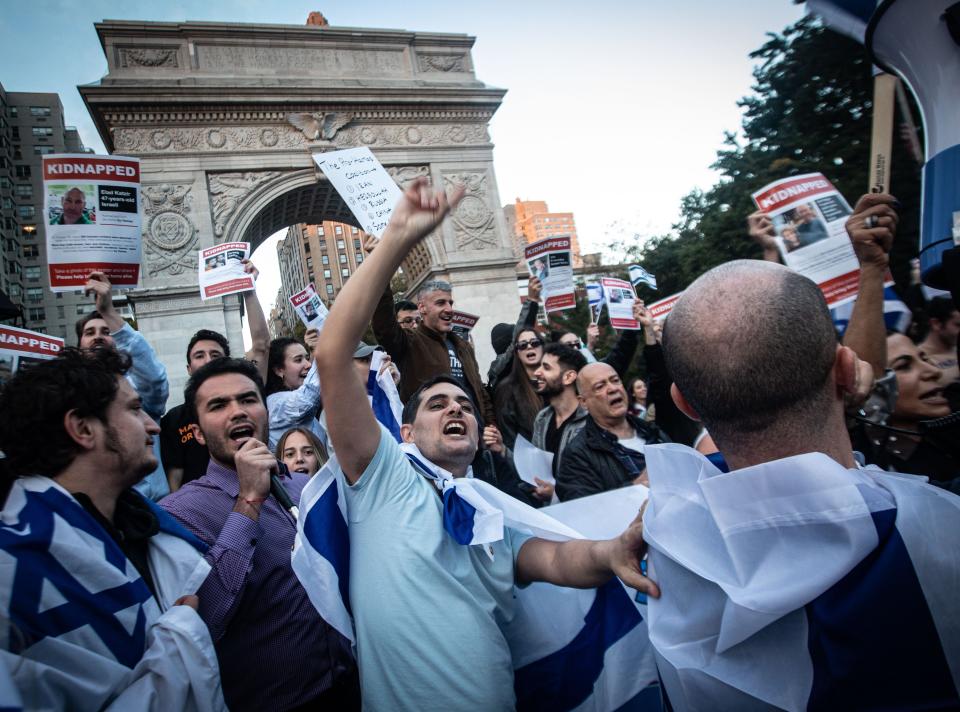Yes, we have an Israel-Hamas cease-fire. We could use a rhetorical cease-fire, too
Advocates on both sides of the conflict in Israel and Gaza are understandably furious. Supporters of Israel were horrified by the sadistically brutal massacre of innocent civilians by Hamas terrorists. For Jews around the world, the attack evoked nightmarish memories of pogroms and mass slaughters culminating in the Holocaust, when two of every three Jews in Europe were systematically murdered.
Supporters of Palestinian rights have been similarly horrified by the tremendous number of Palestinian civilians who have been killed in Israel’s war against Hamas. Even if these civilians are unintended casualties, they are nonetheless lives cut short. Palestinian supporters are understandably enraged every time they see another dead child being dug out from the rubble.
Furious rhetoric fuels a brutal conflict
Furious people resort to furious rhetoric and that certainly has been true for both sides in this conflict. Some Palestinian supporters in academia described the Hamas slaughtering of grandmothers, mothers, and children as “awesome” and “an extraordinary day.” In the immediate aftermath of an attack by an organization sworn to Israel’s destruction, Palestinian supporters have chanted “From the river to the sea, Palestine will be free,” unconcerned that many Jews and others might perceive this chant as an endorsement of Hamas’ bloody agenda.

While many Palestinian advocates rightfully claim that there is a difference between criticizing the Israeli government and criticizing Jews, this distinction has not always been honored in the streets and on campuses. A student at Cornell threated to attack Jewish students, not students who support Israel. Stars of David were painted on the homes of German Jews, not those who applaud Netanyahu.
On the other side, Israel supporters have rightfully decried the horrors of the Hamas massacre, but they have been largely mute about the current suffering and death in Gaza. Even if Israel claims to be defending itself, its actions are still killing grandmothers, mothers, and children.
Supporters of Israel have also been reluctant to acknowledge and condemn the many ways in which the Israeli government has made life untenable for Palestinians. This includes allowing ministers to serve in the Netanyahu government who espouse unbridled Jewish domination, continuing to build settlements in the West Bank on the scarce land remaining for Palestinians, and tolerating violent conduct by militant settlers. Criticism of these policies is not antisemitism and should not be cast as such. Just as many Palestinian supporters have blurred the lines between criticism of Israel and antisemitism, many Israel supporters have blurred the lines between legitimate criticism of Israel and genuine antisemitism.
Turn up the empathy
This heated rhetoric on both sides is understandable. But if these protesters truly care about the people they claim to be supporting, they would do well to turn down the heat and turn up the empathy.
The only humane way out of this bloody conflict is for people of goodwill to build coalitions that can pressure Israeli, Palestinian, and American leaders to pursue peace. They came close during the Oslo Accords three decades ago. Images from that period show an outpouring of joy by many Palestinians and Israelis who thought peace was at hand.
But coalitions for peace can only be built on trust, and the current rhetoric makes that impossible. To build trust, you need empathy. You need to see others as human beings worthy of respect. You must be willing to look at the world through their eyes.
What would this empathy look like in the current context?
For Palestinian supporters, it means considering how their rhetoric will be perceived by Israelis and Jews. If these supporters fail to condemn the Hamas massacre, if they continue to chant “From the river to the sea, Palestine will be free,” if they tolerate openly antisemitic actions, they are sabotaging any chance of finding partners for peace.
Israel-Hamas war: 'Never Again' will never have an expiration date
More perspective: Hamas is not a band of freedom fighters. They are terrorists — like ISIS and al-Qaida
Israel supporters need to appreciate the Palestinians’ legitimate desire for autonomy and support peaceful efforts to achieve it. As a people who have long endured persecution and oppression, Jews should be able to emphasize with Palestinian suffering. And whatever Israel supporters think about Israel’s right to defend itself, they should be alarmed by the suffering currently being inflicted on Gazans. Israel is the dominant power in the region. Its survival does not depend upon pulverizing Gaza, and its continuing to do so promises to produce more Hamas recruits locally and fan the flames of antisemitism abroad.
Israelis and Palestinians have no choice but to share the small parcel of land between the river and the sea. On the other hand, their supporters in the United States and elsewhere do have a choice. They can continue to vilify the supporters on the other side, or they can try to understand them. They can seek to build bridges, or they can burn them. If they genuinely want peace for those whom they claim to support, the choice is apparent.
Alan Garfield is a distinguished professor at Widener University Delaware Law School.
This article originally appeared on NorthJersey.com: Israel-Hamas war: We need a rhetorical cease-fire, too

